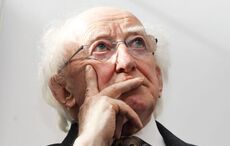The impending resignation of Irish Language Commissioner Seán Ó Cuirreáin on February 23 has sparked a wave of protest all over Ireland.
On Saturday, February 15 speakers and supporters of the Irish language will gather in Dublin to make plain their dissatisfaction with the Irish and Northern Ireland governments’ lack of response to Ó Cuirreáin’s criticisms of their policies. The protest is expected to be the largest public demonstration of support for Irish since the protests of the Gaeltacht civil rights movement in the 1960s.
Ó Cuirreáin was appointed in 2004 to act as legal guarantor for Ireland’s Irish speakers in their long quest for the equal access to state services that their English-speaking fellow citizens have long enjoyed.
Despite some initial successes, Ó Cuirreáin quickly became disillusioned with successive Irish governments’ lack of seriousness on the issue. In his resignation statement he explained that “requiring the people of the Gaeltacht (Irish speaking areas) to conduct their business in English with state agencies flies in the face of any policy which suggests the survival of the Gaeltacht is on the State's agenda.”
In an appearance before the Oireachtas (parliamentary) language committee, at which members of the government parties were notable by their absence, he warned that the Irish state had two simple choices – “to look back at Irish as our lost language, or forward with it as a core part of our heritage and sovereignty.
“It is with heavy hearts that the people of the Gaeltacht and the Irish-speaking community in general will approach the centenary of the 1916 Easter Rising in two years time if our national language is to be merely a symbolic language that is pushed aside, marginalised and left in the halfpenny place in the life of this nation.”
It may surprise readers to learn that 90 years after Ireland gained independence from the United Kingdom you can be arrested for speaking Irish in Ireland, but this is just one of 756 documented instances of discrimination of Irish speakers noted in the Commissioner’s report for 2012.
In the incident in question, which took place in the Dublin suburb of Dundrum in February 2011, a man was detained and taken in handcuffs to a Garda (police) station after being stopped in relation to a traffic offense, when he asked a police officer to deal with him through Irish.
He was held there until a Garda (police officer) was found who could deal with him in the first official language. The man said that the experience had left him “shamed and insulted and I was told several times I did not have a right to conduct business through Irish, that I should desist and that I would not have been arrested if I hadn’t spoken in Irish...I am convinced that I was arrested for speaking Irish and for that reason alone.
“Their excuse was that I was refusing to give them my license but that was not true at all. I am very disappointed, angry and upset about what happened and about the lack of respect and the infringement of my rights.”
It is to highlight incidents such as this, and to put pressure on the Irish state to take the future of the language seriously by providing state services of the same standard and level as those provided in English, especially in the Gaeltacht, that “Lá Mór na Gaeilge” (The Big Day for Irish) has been organized by Conradh na Gaeilge for Saturday February 15. Busses and cars from all over the country will be arriving at Parnell Square in Dublin, bringing together masses of Irish people of all political persuasions and from all walks of life to demonstrate their commitment to choose a future for the Irish language.
After marching to Leinster House participants will be met by Kila, Seo Linn and Na Fíréin, who will be adding their unique musical touch to the event. Those who are unable to be there in person on the day can support Irish online via Facebook at “Lá Mór Na Gaeilge“ or receive further information from the organisers at [email protected].




Comments